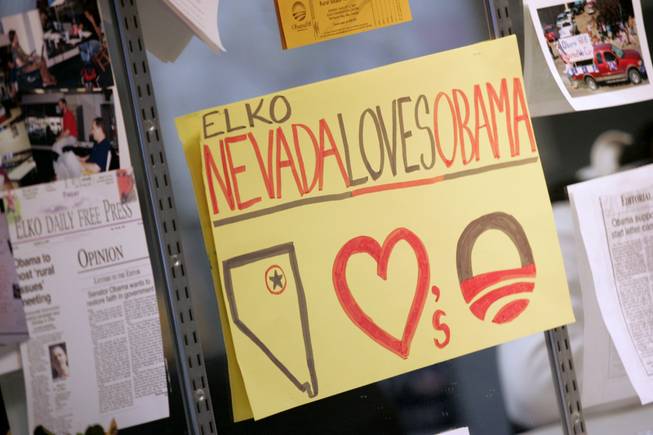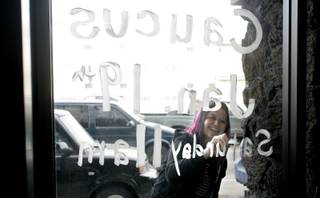
Signs and clippings hang on a wall of presidential candidate Barack Obama’s campaign headquarters in Elko last week.
Tuesday, Jan. 22, 2008 | 2 a.m.
Harry Reid's Caucus
U.S. Senate Majority Leader Harry Reid, D-Nev., returned Jan. 19, 2008, to his rural hometown of Searchlight, Nev., population approximately 800, for the Nevada Democratic presidential caucus. Reid's folksy charm and occasional awkward manner almost make you forget he's the most powerful official in the U.S. Senate. In that role, he spent months working to bring the first early presidential caucus to the state. And with more than 116,000 Democrats participating statewide, the first early caucus in the West proved to be a success.
Sun Archives
- Reid caucuses, but keeps his choice a mystery (1-20-2008)
One intriguing outcome of Saturday’s Democratic caucus is that Barack Obama, a Chicago politician whose appeal nationwide is deep among affluent liberals and college students, broke through in Nevada’s mining and ranching counties.
Obama beat rival Hillary Clinton decisively in nine of 14 rural Republican-dominated counties. In Esmeralda, on the state’s western edge, he won 22 delegates to nine for the New York senator.
Obama’s strength in rural Nevada speaks to the breadth of his appeal and to his campaign’s organizing efforts in Republican strongholds that Nevada’s Democratic Party has traditionally written off. It also indicates a restlessness among voters in rural Nevada that Democrats will try to tap in future elections, including the November presidential contest.
“The Obama campaign sends a message, because even though he lost the state the rurals really made up so much ground for him,” said Cindy Trigg, a rural organizer for the state Democratic Party. “Now any campaign will know that if you court the rurals you can have a tip in your favor.”
Credit the Obama campaign for creating a new playbook for rural Nevada, Trigg said. While Clinton nabbed the backing of traditional Democratic Party leaders, Obama went outside that apparatus, reaching into parts of the state where in the past Democrats had often feared to tread.
Six months before the other candidates, for example, Obama opened an office in the city of Elko, a somewhat more accessible stand-in for the rest of rural Nevada. He also visited Elko before other candidates, and, in November, he came out with an extensive plan geared to rural Nevada. That plan included support for Nevada’s mining and ranching industries, creation of a better communications network and help for small businesses.
“They had an incredible ground game that was really unprecedented for this area,” said Lance Whitney, who helped Obama in his final weeks of the campaign in Elko. “What they found is that people in rural areas see themselves in Barack Obama. They see him as a true American success story. They see him as representing something new and fresh.”
The results in Elko could also provide a hint of sentiments running through the rural electorate. Whitney, head of Elko County’s Democratic Party, ran for mayor against a longtime Republican incumbent and business leader. Whitney, 27, lost, but did better than expected. That convinced him that Democrats can chip away at the Republican grip on rural Nevada.
Now he and other Democratic Party leaders say they see hope -- and guidance -- in the Obama results.
One example of that hope could be found in Shirley Jones, a Republican who said she showed up to Elko’s Democratic caucus because Obama appealed to her more than any other candidate from either party. “I think we need to get out of the Republican mind-set, because they’ve gotten us into debt,” she said.
At another precinct in Elko, Richard Todd switched parties to caucus with the Democrats and was swiftly chosen to advocate for Obama to undecided caucusgoers. Twelve of Todd’s Republican neighbors in the precinct joined him in changing parties to caucus for Obama. Whitney said newly registered Democrats made up one-third of the voters who showed up in his precinct.
That, local political watchers say, is because Elko’s particularly Western, independent brand of conservatism takes nicely to Obama’s anti-partisan, anti-Washington calls for “change,” “hope” and “telling the truth.” Many of those voters also favored Obama because he did not have support from the state party regulars, most of whom lined up behind Clinton.
“While Clinton’s experience is a plus, people here don’t like that mean-spirited inability for people to work across party lines,” said Douglas McMurdo, a columnist and editor at the Elko Daily Free-Press. “Obama seemed to be the one candidate that could mend that.”
For state Democratic Party leaders, the challenge is to build on the work of Obama’s campaign, as well as the efforts of organizers such as Trigg from the state party that threw together a caucus in places where, in some cases, there had been almost no party at all. This year, five rural counties that had been dormant will hold party conventions, Trigg said.
That’s good news for people such as Jill Derby.
When the chairwoman of the Nevada Democratic Party ran for Nevada’s second congressional district in 2006, she often found herself struggling to throw together barbecues and town hall meetings in out-of-the-way counties where there were no Democratic supporters to call on.
Today, the party is “organized out in the rurals down to the precinct level in a way that we haven’t been in the past,” Derby said. “This is going to be a very big lift” for Democrats in future elections.
But making up ground for her -- should she decide to run again this year -- could be tough. Derby received half as much support as her Republican foe last year. The winner, Republican Dean Heller, drew 7,362 votes to Derby’s 3,611.



Join the Discussion:
Check this out for a full explanation of our conversion to the LiveFyre commenting system and instructions on how to sign up for an account.
Full comments policy